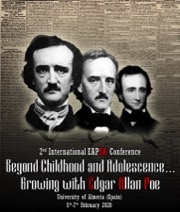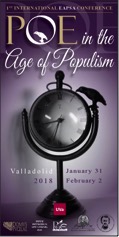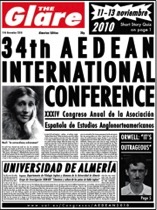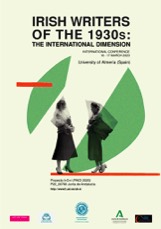After the first international EAPSA conference held at the University of Valladolid in February 2018, this second academic gathering is pleased to host scholars and connoisseurs of Poe's oeuvre from Spain, the United States, Great Britain, the Netherlands, Portugal, Italy, Poland, Ukraine, Taiwan, and Japan. In 1948, T.S. Eliot acknowledged the immense influence of Edgar Allan Poe in France, although his presence was “almost negligible” in England and America. Eliot affirmed that readers in England and America were attracted to the works of Poe “at a particular phase of their growth, at the period of life when they were just emerging from childhood,” thus changing their literary tastes as they reached maturity. Moreover, Eliot wondered what Baudelaire, Mallarmé and Valéry saw in the works of Poe and came to the conclusion that one of the reasons for their appreciation had to do with their inability to understand the English language properly. Such a remark made him understand why Poe’s appreciation was almost inexistent among adult native speaker. The Conference slogan, “Beyond Childhood and Adolescence… Growing with Poe,” addressed the revival of past debates about Poe's writings and his readership throughout time.
2nd International EAPSA Conference, "Beyond Childhood and Adolescence… Growing with Edgar Allan Poe"
Chair: José R. Ibáñez
University of Almería
5-7 February 2020
Although Samuel Beckett’s literary career started in the late 1920s, he only really achieved international acclaim with En attendant Godot (1952), which he soon translated into English, beginning a pattern that would be repeated for the rest of his life. He also translated into French most of his writings in English, becoming, in the words of Nixon and Feldman (2009), the premier bilingual writer of the 20th Century. Very often he supervised the translation of his work done by others and it was frequent the consultation with the author by translators of his texts into a third language. At the same time, translation played a crucial part in his training as a writer; his translation of the “Anna Livia Plurabelle” section of Joyce’s Work in Progress, his work with Nancy Cunard’s Negro anthology, or his versions of surrealist poems in the early 1930s enabled him to develop the necessary skills to resolve the intricacies of linguistic expression that he would put into practice in his mature period. In times of necessity he even turned to translation to increase his income, as happened with the Anthology of Mexican Poetry in the early 1950s. However much he loathed translation, he never stopped translating, and it is the aim of this conference to raise questions about the role of translation in his literary production: What are the differences between the English and the French originals written and translated by Beckett? How does a Beckett text change when rendered into a third language? What strategies do translators employ to maintain the precision sought by the author in the original version? How does a text written by Beckett sound in other languages? These and other questions were addressed at this academic conference.
5th International Conference of the Samuel Beckett Society, "Samuel Beckett and Translation"
Chair: José Francisco Fernández Sánchez
University of Almería
9-11 May 2019



1st International EAPSA Conference, "Poe in the Age of Populism"
Chair: Santiago Rodríguez Guerrero-Strachan
University of Valladolid
31 January-2 February 2018

The annual gathering of the Spanish Association for English and American Studies (AEDEAN) was held at the University of Almeria in November 2010. The event organized by the Departamento de Filología Inglesa y Alemana was also co-sponsored by Lindisfarne Research Group. Papers delivered at the 34th AEDEAN Conference attested to the innovative character of the Conference academic meetings, covering diverse areas among which Comparative Literature, Critical Theory, Feminist and Gender Studies, Language Teaching and Acquisition, Phonetics and Phonology, Short Story in English, Translation Studies or U.S. Studies, just to name a few. As plenary speakers, the Conference proudly hosted the American writer Moira Crone and the British author Toby Litt along with distinguished academics David Britain (University of Bern), Juana Mª Marín Arrese (Complutense University, Madrid) and Aída Díaz Bild (University of La Laguna).
34th AEDEAN International Conference [XXXIV Congreso Internacional de la Asociación Española de Estudios Anglonorteamericanos (AEDEAN)]
Chairs: José Francisco Fernández Sánchez & José R. Ibáñez Ibáñez
University of Almería
11-13 November 2010
Conferences organized
The Edgar Allan Poe Spanish Association (EAPSA) held it first international conference between January 31 to February 2, 2018 at the University of Valladolid (Spain). The conference motif explored topics which put in context Poe's texts with convoluted moments of the history of the U.S. Poe lived, and wrote a substantive body of his work during the presidency of Andrew Jackson (1829-1837), a populist who came to be known as "King Mob". Nowadays the rise of populism is once more at the forefront of politics and arts not only in the U.S. but in Europe and South America. Debates regarding the meaning and action of populism are common in our society. Among the issues that have made their appearance on, or reentered the stage in recent years are topics as varied as whether or not sentimentalism should be considered a central component of politics, thinking about the people as opposed to the cultural establishment, and questioning social institutions.
The so-called new age we are entering is an eventful and timely moment to reexamine Poe's life and work, as well as the society in which he lived, in relation to populisms both past and present. The conference addressed questions such as the following: in what ways was Poe influenced by the populist strand of Andrew Jackson? Were the cultural changes of the period established for the long-term, or were they short-lived? How has populism influenced the reception of Poe? Can Poe be a meaningful writer in and to our society?
The conservative measures implemented by successive governments of the Irish Free State between 1922 and 1940, including the banning of divorce and widespread censorship of printed materials, have projected an image of Ireland in the 1930s as opposed to the contemporaneous (artistic and) literary effervescence characteristic of continental Europe and North America. Historical analyses of the period are, at times, polarized between a deep provincialism supposedly located in Ireland and creative possibilities of exile for national writers. However, as recent studies on the ‘London Irish’ and on the work of almost forgotten writers have revealed, there existed in the 1930s a vibrant appreciation and response to international politics and artistic and literary innovations. Many Irish writers (Kate O’Brien, Elizabeth Bowen, Sean O’Faolain, Liam O’Flaherty, to name but a few) felt at ease in this climate. Writers who were engaged in anti-fascist activities, for example, were at the center of a myriad of activities that eluded frontiers. Reconsidering Irish literature in the 1930s in light of recent critical work would further enhance an understanding of a decade of writing which, until recently, was subjected to narrow interpretations. At a time when a fledgling democracy was being created in Ireland, the influence of these and other connections in the realm of culture cannot be underestimated. This conference drew together the existing scholarship on this period and will strengthen it with the critical literature that the conference would generate.

Irish Writers of the 1930s: The International Dimension
University of Almería
16-17 March 2023
